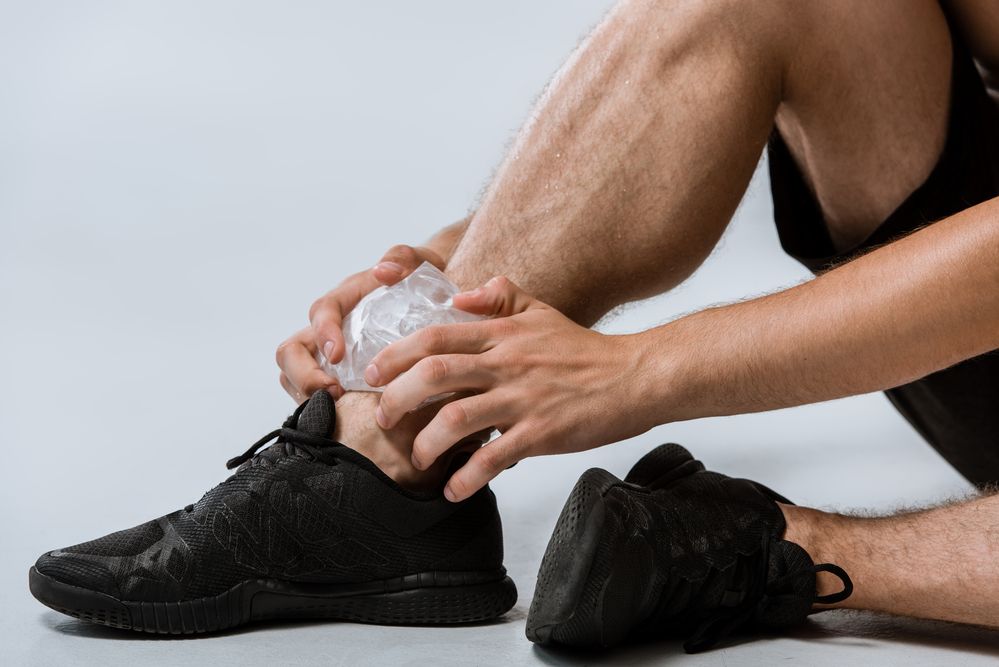
How old information and stereotypes can undermine quality healthcare
If you're a baseball fan, you're familiar with the sight of a pitcher with his or elbow encased in ice.
Football athletes still dunk themselves into ice baths, and treat on-field injuries with ice.
Man, Conventional Wisdom dies awfully slowly.
To our detriment.
Back in 1978, Dr. Gabe Mirkin coined the term RICE (Rest, Ice, Compression, Elevation which transformed on-the-spot injury treatment the world over. His book became a best seller, and he was lauded for his discovery.
Problem is, that it's not always a good protocol.
Mirkin wrote an article for his website in 2015 recanting his RICE protocol, offering up lots of up-to-date research on what RICING an injury is a bad idea. His piece:
Why Ice Delays Recovery
Look, for my sports injury money, any time a doctor has the guts to publicly own that he was wrong, especially when he in so many ways single-handedly transformed injury management, I am in awe.
Problem is, not many seem to have gotten the message yet.
Conventional Wisdom (CV) dies a very slow death, particularly in medicine. It's not just that medical providers can't possibly keep up with what's new. It's also that those ideas become habits, and ingrained habits become lore, and lore is hard to rewrite after it's hardwired.
My own experience with this is instructive.

Tape it and keep right on moving
In 2014 I was hiking downhill from Dead Woman's Pass on the Macchu Picchu trail. As any good hiker knows, or should know (as I should have known), you can't hike safely AND look at the stunning views. Pick one, or get hurt. This is one place you do not multitask.
Downhill from the summit is a long scattering of uneven, slick stones, made so by years upon years of millions of feet. I looked up, awed by the heart-stopping scenery suddenly revealed when I stepped out from underneath the clouds, but didn't stop. The second I did that I lodged my boot between two rocks. I did a header, and as happens when you go ass-over-teakettle but your ankle doesn't go with you, ligaments tore.
Startled, the hiker behind me did precisely the same thing. We landed with an "OOF" a few feet from each other. I broke into laughter, as is my habit when I do something stupid. We grinned at each other in that goofy way that folks do when they pull a dumb stunt.
I waited for the first wave of pain to pass, pulled my foot out of my boot and watched the swelling eagerly begin. In my case it's always far more spectacular because I'm a bleeder.
Swiftly I pulled some Rocktape out of my bag. Strapped the ankle to both support it and to ensure that the swelling wouldn't make getting my foot back into the boot impossible. I popped a Tylenol, then headed down the hill.
I always hike with poles. For about a mile my ankle carried on a lively conversation. That was the end of it.
It got purple, but never swelled. I never slowed down, either. And I never needed ice. Of course it was painful. But I learned an important lesson: unless I have a compound fracture or the like, tape and keep moving.
Since then, unless I have a serious break, that's what I do. Wrap it lightly, and keep moving the injured joint. Works like a charm. That's how Nature heals. Icing can get in the way. As with most things, though, it depends.
CV throughout medicine
A few years later I was transferred to a new Primary Care Provider. She was an RN and an endurance runner. One day she casually commented on whether I knew the importance of RICE for my injuries. She'd had no clue that Mirkin had recanted, so I sent the article her way.
This was a serious distance runner, for whom sprains like that were nearly guaranteed, and a nurse to boot. She didn't know. Most still don't.
I am by no means calling her out. But this is how bad medicine disguised as CV is perpetuated.

You could make the same kinds of arguments about the medical mindset around obesity. The old calories in, calories out talk is not only massively outdated but also wrong. The intense prejudice against fat folks by doctors doesn't help, but their complete unwillingness as an industry to acknowledge the deep complexities of dealing with issues of weight perpetuates fat hate and victim-blaming behavior.
Doctors can be and are as ignorant as anyone else. The problem is when their ignorance can kill or cripple, to say nothing of the emotional toll on patients seeking help, not harassment.
To that:

It would be fair to say that a good bit of what obese/large people experience from doctors is based not only on very bad medical information- to say nothing of dated- but doctors themselves carry the fatphobic gene right into their practices. Dealing with large folks means that they have to expand their understanding of medicine and psychology.
Any doctor who implies or states that all you gotta do is exercise more is seriously uninformed, out of touch and Just. Plain. Wrong. But it's Conventional Wisdom.
That's work. Too many medical folks are either overwhelmed, or lazy, or their own prejudices blind them to what's changing in the world and has been for a long time.
Or all three.
To this, if you feel or get direct impressions that your doc is fat-shaming you, get thee gone. Now. Not only is that irresponsible, it's the worst of bad medicine, and you will never be well or heal in the presence of such a practitioner.

Medicine is hard labor. While I very much understand those pressures, perhaps more than many, the kind of challenge indicated above shows why it's so very important that you and I do some of the heavy lifting. If I may: the suicide rate among doctors in the US is appallingly high, some 300-400 a year. It's not just that the pressure on students, their ridiculous and exhausting hours, the debt load and internships are brutal.
It's also that too many of us expect them to be God, and want to sue them if a) they turn out not to be God, b ) make a mistake (even God made a mistake; ever seen a platypus? Must've been a hangover) c) won't give them the "magic pill they saw on TV." Or whatever.
The amount of new information that gets published every year is prodigious, especially concerning new conditions, rare conditions and exotic diseases that are showing up on the radar as if they were coming in from Mars.
A tick bite that means you can't eat meat? Really?
Yes, that's a thing. It's new. Covid? Well, you know. And anyone who's watching the news unfold with that understands the very fluid nature of knowledge, research and experience.
We want, expect, demand our docs to be able to Know It All, and then Fix It All, with the minimum amount of effort on our parts.
Not only is this impossible under normal circumstances, under a pandemic, it's even harder.
While there are plenty of doctors who probably aren't very good, there are plenty who are very good, but also utterly overwhelmed, especially by unreasonable expectations. Right now those docs, nurse, PAs and all the rest need our thoughtful and well-informed help.
What can you and I do? Well, for one, we can be smarter. Act smarter, and take responsibility for our health at a whole other level.

The way I see it, you and I have just as much a role to play- or more so- in this as they do. First, we don't go in for a hangnail, unless it's infected. Second, STOP ASKING FOR ANITIBIOTICS for every tiny thing, especially for your children. Just stop. Because one, the ones we have are starting to fail, because we demand them for illnesses for which they have no effect (viral infections, for one). Two, we've done this for so long new strains have developed for which there are no new antibiotics. Three, when you and I overuse antibiotics we completely screw up our microbiome by wiping out all the good bugs. That's a whole other article but suffice it to say that the more we learn about the body's "second brain" or gut biome, the more we realize that antibiotics can in some cases do far more harm than good. When you overmedicate your children with unnecessary antibiotics, you could cripple them later in life.
Do your research online, yes. But kindly don't walk in with a laundry list of all the deathly illness you have that have no basis in reality. Know what they might mean. Then ask good questions. And be willing to ask yourself how much you would be willing to give up bad habits for better health, if that's what your doc says.

Our doctors are health partners. Period. You and I are masters of our own skin suites, and what's in them. That means that we take a sane, sober, competent approach to understanding symptoms, our bodies and how they work. While the complex processes may seem miraculous to use- like healing- and indeed in so many ways they really are, health isn't truly all that hard. We get in the way of our health with poor lifestyle habits, listening to cranks (Goop, anyone?) and not staying up to date on what is new. Our docs can't always do that. With the Internet, you and I can in many ways be better partners.
You and I can challenge Conventional Wisdom with some solid inquiries of our own. Kindly, that doesn't mean crystal cures, essential oils or bleach to heal Covid and the plethora of dangerous and downright deadly so-called "miracle cures" that scammers are pushing at legitimately frightened folks. Good doctoring is based on clear-eyed science. Science is constantly changing. That doesn't make science suspect. Hardly. What it does mean is that there are a great many very smart, very dedicated folks doing their level best to get answers to what ails us.
But even the best of science cannot do much about our choices:

Much of what ails is what fails us: our lack of commitment to self-care and self-regulation. When you and I put the work in to do a bettter job of those things, our docs have a whole lot less to do, including trying to make clear that a magic pill for this, that or the other self-inflicted illness isn't going to cure us the way better lifestyle habits will.
Ultimately, you and I are our own best physicians. In an ideal world, we wouldn't need much doctoring, barring a busted elbow or food poisoning. Better choices, better habits lead to better health. Better health means fewer trips to the doctor or nurse along with a far greater ability to fend off bad bugs and bad luck.
That's also Conventional Wisdom. In this case, it really is very wise.

Comments powered by Talkyard.